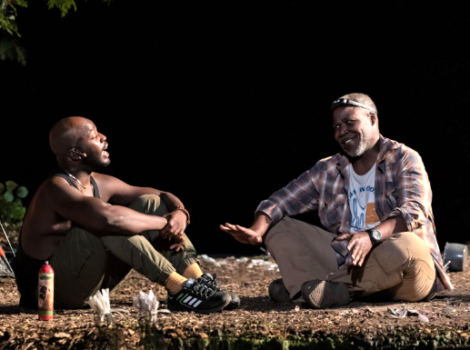Queen of the Night
Dorset Theatre Festival
Written by travis tate, directed by Raz Golden
“…feel like an alien on a distant world”
“Queen of the Night” is a villainous character in Mozart’s opera “The Magic Flute.” Her two arias are spectacular, the second one having gained supreme stature among opera devotees, and its best singers having become gay idols. This queen rules over the powers of darkness.
There is also a large white cactus flower called “Queen of the Night” that only blooms after the sun has set. Anything but delicate, its sturdiness protects it from the harsh rays of its native desert environment.
“Queen of the Night” is also a term sometimes applied to a gay man who frequents dimly lit bars to pick up tricks for anonymous sex.
travis tate uses all of this subtly in his extraordinary new play, “Queen of the Night,” now in its world premiere at Dorset Theatre Festival’s outdoor season at Southern Vermont Arts Center in Manchester, Vermont. The play is set in the dark of night, in a state park outside Houston, Texas, where a father and son have come to spend three nights camping and bonding over the issues that divide them.

Stephen and Ty, father and son, have escaped social responsibilities at Stephen’s ex-wife’s impending wedding by retreating to a favorite plateau in the state park, a place of previous outings that affords them a certain degree of safety from the world and its cares. They erect separate tents, prepare for bears, fish, and cook dinner over an open flame. They forage as needed. They talk. Their talk, some of it long overdue, takes them into foreign territory they’ve avoided for a long time.
Set, as it is, in an open field surrounded by woods on the SVAC property, where natural sounds combine with taped cues, this play feels like its audience is in neighboring clearings where all can be overheard, where everything is real. The setting, designed by landscape gardeners Justin and Christopher Swader, adds a remarkable reality to this play.
Danny Johnson is a lovely and loving Stephen, a man who needs to push his son to confess and come to grips with his identity. At the same time, he himself is struggling with the realities of his life, and coming to an understanding of what has brought him to where he is now. His world has exploded around him and his complacency has only helped to a degree. Stephen’s friendship with his younger son has festered and he wants to change all that, but his method is rudimentary and his manner abrupt.

He is a good man, whom Johnson plays effectively. He falls back instead of forging ahead. Using metaphor as a resource, Stephen finds himself lost at sea in this desert parkland. Watching Johnson extricate his character from the morass of careful language is a beautiful thing. This father wants truth and to get it he is forced to expose himself to his son, to also be truthful in all the areas that pain him. The gradual reveals are fascinating. Johnson makes it seem as though reality is a trigger of a gun that rarely fires. He handles the slow reveals like delicate china being passed from hand to hand in an overcrowded dining room. When shared experiences begin to break down his son’s careful reserve, Johnson’s Stephen also begins to alter, his manner becomes more gentle, more humane.
Leland Fowler’s Ty is prickly. He is indulging his father, and at the same time reliving childhood thrills that have given him stability for most of his life. That he is both gay and challenged is never in question. His self-loathing comes and goes and his self-assurance is of utter importance. When Stephen turns the topic of his homosexuality up to cooking-fire intensity, he is thrown onto the flame and it becomes his dare — to fry or to fly.
Fowler is up to this challenge, marking his temper’s time as the conversation becomes more anxiety driven. He plays the difficult transitions in Ty’s love-life, sex life, and family life as constantly on edge. He struggles to maintain his cool, which, when it blows, blows as hot as the Queen of the Night — your pick of which one.

Too often in this play, the characters switch sides. Ty questions Stephen’s actions and reactions to things in his own life and Stephen openly accepts the realities of his son’s choices. Each of the men have less distance to travel to openly embrace the other’s problems and prejudices. To us, in the next campsite, these are emotional and intellectual equals. That is the play’s only flaw and it can basically be ignored.
The graceful symbolism of this play’s production is given full attention by the designers and director. A natural darkness descends as the two men make camp, making a statement about what’s to come. Set in the dark and played in the dark, the play’s lighting designer, Yuki Nakase Link, has almost made darkness a third character. Costume designer Fabian Fidel Aguilar dresses the men simply and appropriately, and sometimes with humor; Ty often seems to be mostly naked as he opens himself to truth. The sound design provides so much context that when thunder and lightning broke out, I wasn’t sure if it was designed or real. Raz Golden has directed a play that seems so real, so genuine from moment to moment, that we really do feel like incidental eavesdroppers. He has used tate’s writing style, his overt naturalism, to forge a stage product that never becomes stagey. We live through an experience that, like the white flower on the wrong bush, is where it belongs.
“Queen of the Night,” in its world premiere by Dorset Theatre Festival, plays at the Southern Vermont Arts Center in Manchester, Vermont through September 4. For information and tickets, contact Dorset Theatre Festival at 802-867-2223.








